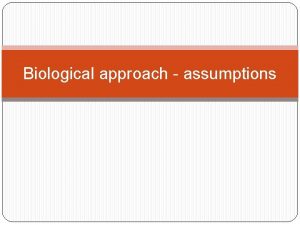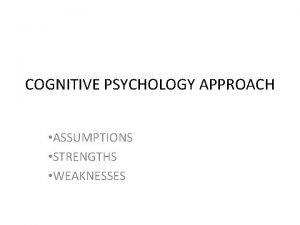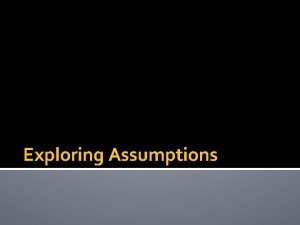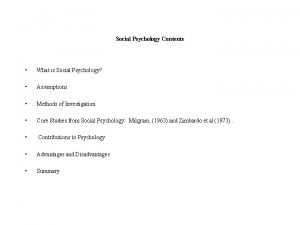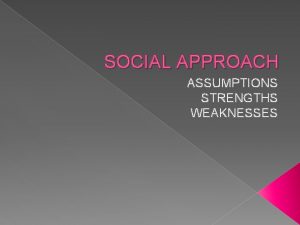SOCIAL PSYCHOLOGY Social Psychology Assumptions That other people











- Slides: 11

SOCIAL PSYCHOLOGY

Social Psychology • Assumptions: That other people influence our behaviour. 1. Individuals and groups affect behavior (you act differently with your friends than you do with your parents) 2. Culture and Society affects behavior (women have to walk behind men in some cultures ect. )

Social Psychology Words • Prejudice – A bad opinion of another person without knowing them, based on what they look like. • Obedience – To follow orders given by another person • Conformity – To act the same as other people. For example, dressing the same, listening to the same music etc.

Strengths of Social Psychology • Attempts to use real life situations when studying behavior. EX: Field study with “men only” and “women only” signs on doors.

Strengths of Social Psychology • It makes contributions about understanding social behavior (high degree of usefulness). • It can explain and even offer solutions to problems in the real world. • EX: Milgram experiment and obedience

Weakness of Social Psychology • Ethics -- when do we know that we are crossing a line? • It is difficult to study social behavior without negatively affecting the participants in the study • EX: Milgram study

Weakness of Social Psychology • Generalizability of findings. • Often the samples used are very restricted • EX: Milgram study: sample? ?

Research Methods: Strengths & Weaknesses

Quasi experiments • They are conducted in a natural environment. • The independent variable is not manipulated by researchers; it occurs naturally. Strengths: • There is a very low chance of demand characteristics and experimenter bias occurring. • The natural environment and lack of manipulation means that everything is natural and realistic, therefore there is high ecological validity. • They are useful in situations where it would be unethical for the experiment to manipulate a variable. Weaknesses: • The experiment has no control over any variables. • It is very difficult to replicate so reliability is difficult to check. • They can be very time-consuming.

Field experiments • They are conducted in a natural environment. • The independent variable is manipulated by researchers. Strengths: • There is higher realism as the environment is natural. • Behaviour is more likely to be natural, therefore the ecological validity is also high. Weaknesses: • There is less control over extraneous variables (e. g. weather conditions). • It is difficult to replicate them completely. • They may be time-consuming and costly.

Laboratory experiments • They are conducted in a laboratory. • The independent variable is manipulated by researchers. Strengths: • There is tight control over variables. • Cause and effect (causal relationship) is easily identifiable. • They are usually replicable. • They are usually less time-consuming and less costly. • Scientific equipment is used. Weaknesses: • The artificial environment means there is low realism. • Demand characteristics and experimenter bias may occur. • There is usually low ecological validity as it is an unrealistic setting. • A laboratory means limited space; you can’t fit a big sample into a laboratory at once.
 Phân độ lown
Phân độ lown Block xoang nhĩ độ 2 type 1
Block xoang nhĩ độ 2 type 1 Thơ thất ngôn tứ tuyệt đường luật
Thơ thất ngôn tứ tuyệt đường luật Thơ thất ngôn tứ tuyệt đường luật
Thơ thất ngôn tứ tuyệt đường luật Chiến lược kinh doanh quốc tế của walmart
Chiến lược kinh doanh quốc tế của walmart Tìm độ lớn thật của tam giác abc
Tìm độ lớn thật của tam giác abc Hãy nói thật ít để làm được nhiều
Hãy nói thật ít để làm được nhiều Tôn thất thuyết là ai
Tôn thất thuyết là ai Gây tê cơ vuông thắt lưng
Gây tê cơ vuông thắt lưng Sau thất bại ở hồ điển triệt
Sau thất bại ở hồ điển triệt What is the biological approach
What is the biological approach Cognitive psychology strengths and weaknesses
Cognitive psychology strengths and weaknesses










